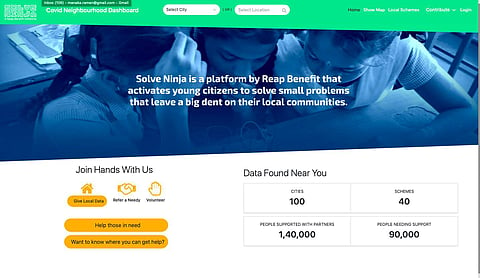

With most of the local shops shut down amid the lengthy Coronavirus lockdown, people have been worried about their regular supply of food grains, medicines and other essential, familiar services like their local grocery stores, petrol stations, pharmacies, ATMs, etc. For example, most of our relatives back in our hometowns are quite apprehensive about what quality of products they are being sold if they do not buy it from the ones they trust. To come up with a quick solution to this, Reap Benefits in Bengaluru has developed a neighbourhood dashboard that provides information about local shops, clinics, COVID-19 test centres, pharmacies and more for people to navigate amid the lockdown easily.
In 2012, Gautam Prakash and Kuldeep Dantewadia started Reap Benefit, a social enterprise which solves local issues (environmental and civic) with young people. Called Solve Ninja, their neighbourhood dashboard provides users with access to information on the location of the closest COVID-19 testing centre, first responders and public health centres. "It also provides information about local shops delivering groceries and pharmacies too. Additionally, citizens can access information around government schemes and relief initiatives such as rations, medicines, government canteens and shelter homes," explains Kuldeep.
Migrant and daily wage earners have been the worst hit by the pandemic, losing their livelihoods and with it shelter and their ability to care for themselves and their families. "By mapping the location of people in need on our dashboard, citizens are helping nonprofits and government agencies know which areas are in need of relief and support," he adds.
The dashboard, an easy-to-use digital platform, started providing information in just Bengaluru but in just two weeks' time, it expanded to offering citizens hyperlocal information in 15 cities and towns and has enabled relief to be provided in over 100 geographies across the nation — Chennai, Hyderabad, Mumbai, Delhi are some.
Kuldeep tells us, "To give you an example of how the dashboard has been used in the past, in 2019, two of our Solve Ninjas (the name we give to our young problem solvers and leaders) Shriya Shankar and Pranav Shikarpur used the dashboard to map where Bengaluru citizens could find eco-friendly Ganeshas. The dashboard helped reduce Plaster of Paris idol immersion in local water bodies to just two per cent in the city that year. When the Government ordered the first phase of the lockdown we saw that this platform could be used by citizens to access essential information and also provide community-level information that could help nonprofit and government agencies."
What's even more helpful is that users can not only access this essential information, but they can also add information on the dashboard. They can provide information and map the locations of families in need of assistance in their respective localities. The dashboard allows crowdsourcing of information on requirement of food on the ground by several communities, social distancing, worker communities, and more.
The basic version of the neighbourhood dashboard was created by Reap Benefit’s co-founder and CTO Gautam Prakash and Project Manager Rizwan Pasha. "In under a month, we were able to add more geographies and features to the dashboard which was possible thanks to support from Cisco and NIIT. We also received tremendous technical support from Alok Kuchlous CEO of Mirafra Technologies and his son Sahil Kuchlous, a grade 11 student of Inventure Academy, Bengaluru," says Gautam.
The dashboard initiative has also helped the Reap Benefits team to collaborate with NGOs to map the location of people in need. "These people are mostly migrant workers and daily wage earners. Once our team procures the details of where those in need of support are located, the dashboard helps us to map it. This is then passed on to organisations working on the ground to organise rations, medicines and other necessary supplies. They then ensure that the people in need of assistance receive these. We have till date mobilised supplies and relief to 1.4 lakh people via a coordinated multi-NGO effort with organisations like With Bengaluru, Hasirudalu, Whitefield Rising and White House Society, Teach for India and Dream and Dream," concludes Kuldeep.
